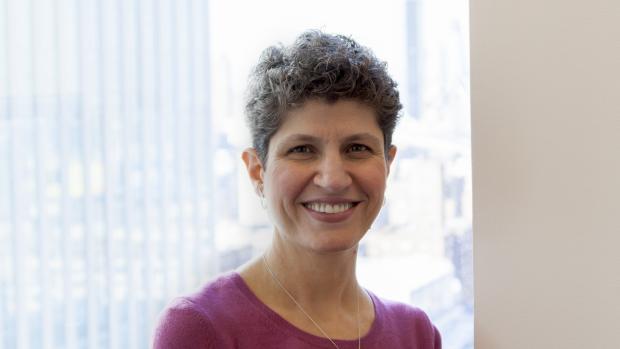Elza Erkip wins prestigious award for trailblazing work on next-generation wireless networks
NYU Tandon professor garners Edwin Howard Armstrong Achievement Award. Erkip is only the third woman ever to win the coveted IEEE Communications Society prize.

BROOKLYN, New York, Thursday, November 18, 2021 – Elza Erkip, an Institute Professor of Electrical and Computer Engineering at the New York University Tandon School of Engineering, has won the Institute of Electrical and Electronics Engineers (IEEE) Communications Society Edwin Howard Armstrong Achievement Award for her “pioneering work in cooperative communications and relay networks.”
Erkip is only the third woman ever to win the Armstrong Achievement Award, after Andrea Goldsmith of Princeton University in 2014 and Muriel Medard of MIT in 2017. She is the second NYU Tandon professor: Theodore “Ted” Rappaport, the founding director of NYU WIRELESS, is the 2015 laureate.
Erkip, who is also on the faculty of the academic research center NYU WIRELESS, has long been interested in how information theory — a discipline concerned with representing, communicating, processing, and using information — can make an impact in a wide range of diverse fields.
Users of smart phones and IoT devices may not be aware of the kinds of advances made possible by Erkip’s work, but cooperative networking, for example, greatly increases the reliability and speed of wireless networks, resulting in faster downloads and better coverage. Her work thus set the foundation for the fifth-generation (5G) service now being widely commercialized—as well as the possibilities for 6G currently being explored.
“Information theory has had a significant impact in communication systems,” Erkip explains, “and now new areas of research are opening up, and new connections are being made with many emerging scientific and societal issues.”
Among those new areas is robotics. She explains that outsourcing a mobile robot’s artificial intelligence (AI) functions to the edge cloud — the server in the cloud closest to the robot — could provide noteworthy operational benefits, such as allowing robots to perceive the environment, perform complex operations, and make decisions autonomously, all without incurring major energy and weight costs from onboard computational and power-generation equipment. There are significant technical hurdles, however, which she is working to address. “The goal is to design algorithms that optimally distribute computation between robots and the cloud,” Erkip says, “while considering factors like range and robustness.”
Among the many other honors won by Erkip — a past president of the IEEE Information Theory Society, a member of the Science Academy of Turkey and a Fellow of the IEEE — are an NSF CAREER Award in 2001, the IEEE Communications Society WICE Outstanding Achievement Award in 2016, and the IEEE Communications Society Communication Theory Technical Committee (CTTC) Technical Achievement Award in 2018. Her paper awards include the IEEE Communications Society Stephen O. Rice Paper Prize in 2004, the IEEE Communications Society Award for Advances in Communication in 2013 and the IEEE Communications Society Best Tutorial Paper Award in 2019. Additionally, she has been named a Clarivate Highly Cited Researcher, indicating that her work is among the most cited in her field.
“Without Elza Erkip’s seminal research, mobile communications would not be as advanced as they now are,” says Jelena Kovačević, Dean of the NYU Tandon School of Engineering. “Anyone who uses high-speed wireless networks, which, frankly, is almost all of us, owes her a debt of gratitude. Her latest IEEE honor is richly deserved and indicates the importance of her body of work.”
Erkip will be given the Edwin Howard Armstrong Achievement Award, which is named for the engineer sometimes called “the father of FM radio,” at IEEE’s GLOBECOM 2021, to be held in Madrid, Spain, on December 8, 2021.
About the New York University Tandon School of Engineering
The NYU Tandon School of Engineering dates to 1854, the founding date for both the New York University School of Civil Engineering and Architecture and the Brooklyn Collegiate and Polytechnic Institute. A January 2014 merger created a comprehensive school of education and research in engineering and applied sciences as part of a global university, with close connections to engineering programs at NYU Abu Dhabi and NYU Shanghai. NYU Tandon is rooted in a vibrant tradition of entrepreneurship, intellectual curiosity, and innovative solutions to humanity’s most pressing global challenges. Research at Tandon focuses on vital intersections between communications/IT, cybersecurity, and data science/AI/robotics systems and tools and critical areas of society that they influence, including emerging media, health, sustainability, and urban living. We believe diversity is integral to excellence, and are creating a vibrant, inclusive, and equitable environment for all of our students, faculty and staff. For more information, visit engineering.nyu.edu.

